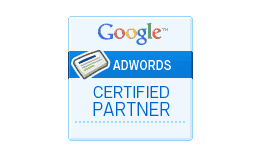At The DMA, we love building great WordPress sites. Once that job is done, we have a suite of skills and capabilities to help you get the most from your site. We often work with client to undertake a strategic review of opportunities, and craft an easy to follow strategy that covers a range of marketing initiatives both on-line and off-line.
One of the key online strategies is Search Engine Marketing. These are the ads that appear on the top and right hand side of search results as shown below.
This search is for the phrase “family holidays gold coast” (1), and key filters or search controls for the user are (2) and (3). The Search Results start with (4), showing three paid ads at the top, and further ads along the side. The “organic” search results are shown (5) below these ads, and include a number of Google Places results (the red pins labelled A to G in these results). At The DMA we focus on Google in our Search Engine Marketing, as this accounts for 90+% of searches in Australia. However, we have also set up campaigns in Bing and in Facebook for clients if these tools offer better potential results for their specific objectives.
The Ads appearing here are called Search Engine Marketing, as these ads appear along side the search results. This is powerful advertising, as you can target various phrases and reach customers at the right time in their buying cycle. These ads are also referred to as “pay-per-click” referring to the fact that you pay each time someone clicks on the ad and goes through to your website. The current operation of Search Engine Marketing can be much more sophisticated than pay-per-click, and with the right set-up and campaign it’s possible to pay per conversion (defined as the action the visitor takes on your site).
The power in Search Engine Marketing lies in the quality of data and the control of budget. With each click, visitor and website action, you get detailed information on how the ads and targeted search terms are performing, allowing us to make adjustment and optimise the campaigns. We also combine Search Engine Marketing with a specific plugin we have developed for WordPress that gives us more information about the visitor (the Google Analytics to Form Plugin). This is in contrast to traditional media advertising, where it is very hard to correlate business activity to advertisements. The budget aspect refers to the fact that you control how much you spend – by setting a daily limit. You can also target your spending to specific campaigns and activity, giving you a granular control.
The set-up and management of search engine marketing campaigns is complex, and needs to be tailored to each customer and their marketing objectives by a trained and qualified profession. 
The DMA is a Google Certified Partner Company (see The DMA’s Profile), and Jon Tinberg is our lead and our Google Certified Professional since 2010. To maintain this certification, Jon undertakes regular study and annual exams (see Jon’s Profile), and The DMA continually up-dates our policies and procedures to maintain best practice in Search Engine Marketing. The DMA follows:
- The Google Third Party Policy, which covers reporting and management of client accounts.
- We refer all new clients to the Google Guidelines for Working with Third Party Providers. This disclosure is important part of the compliance and should be provided by all Google Certified Partners.
Recently, we also completed the Google Audit of Third Party Providers, which ensures that providers are following best practice in these area.
When you engage The DMA to set-up and/or manage your Google AdWords Account, you can be confident that you are engaging a professional organisation who will work with you to ensure that your Search Engine Marketing meets your overall marketing objectives.


